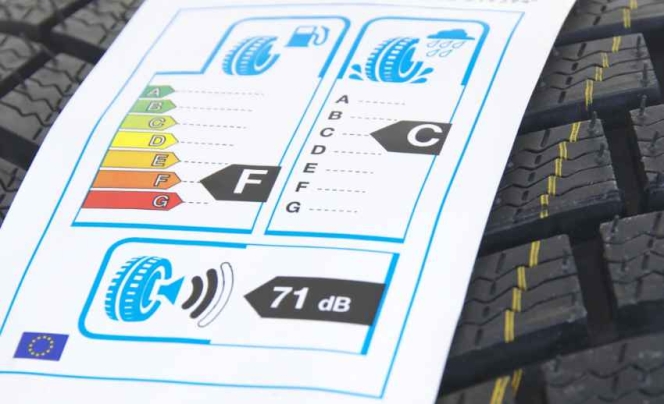
The European Parliament has approved the revision of tyre labelling regulations six years after it was introduced. ‘This now depends on extraordinary efforts from the institutions to develop the EPREL’s tyre application in a timely manner and industry to implement it effectively. We all want this regulation to succeed in improving the market uptake of those tyres performing at the highest safety and environmental standards,” Fazilet Cinaralp, Secretary General of the European Tyre and Rubber Manufacturers Association (ETRMA), tells Tyre Trends

European Tyre and Rubber Manufacturers Association
"The European tyre industry is fully committed to the Tyre Labelling Regulation and its success,” says Fazilet Cinaralp, Secretary General of the European Tyre and Rubber Manufacturers Association (ETRMA). The revision, which is currently being done, comes six years after the initial regulation and collaboration between industry and the European Institutions. It promotes industry innovation and benefits consumers by increasing consumer awareness of the label and strengthening market surveillance and enforcement in the EU Member States.
To ensure its success, ETRMA supports the timely development and sufficient lead-time of all pieces of the revision, particularly the European Product Database for Energy Labelling (EPREL). The publicly available database registering tyre performance is important in strengthening the information chain between tyre manufacturers and authorities and improving market surveillance. However, the EPREL’s tyre application still needs to be developed.
“The industry has concerns that there might not be enough time to ensure a smooth transition to this new system amidst an already challenging environment that deals with these new requirements,” Fazilet Cinaralp told Tyre Trends.
The revision foresees the database to be completed before the final adoption of the proposal to allow for a smooth and orderly implementation of the regulation by 1 May 2021. Industry will need to upload information into the database about the tyres to be placed on the market.
“This now depends on extraordinary efforts from the institutions to develop the EPREL’s tyre application in a timely manner and industry to implement it effectively. We all want this regulation to succeed in improving the market uptake of those tyres performing at the highest safety and environmental standards,” she added.
Committed to emerging from the public health crisis even stronger than before, the industry stands ready to cooperate with EU Institutions to make this possible and looks forward to consumers using this updated tool to inform their choices towards tyres with the best safety and environmental performance.
The industry remains fully committed to work towards the European Green Deal, seeks to prioritize in partnership with the authorities the initiatives to achieve climate neutrality and digital transition, and requests a supportive and reasonable timing to the overall changing regulatory framework.
Shared commitment
This collaboration builds on a shared commitment to the European Green Deal, without compromising the important role tyres play in road safety and mobility, nor the tyre industry’s ability to innovate and remain competitive.
To this end, ETRMA calls for speeding up the regulatory work on smart mobility to enable new digital transportation services and tyre data solutions as an opportunity for economic recovery and sustainable development. A lack of timely, comprehensive regulation may cause market failures with regard to technology adoption, platform interoperability and unjustified barriers to competition.
ETRMA has been supporting tyre industry investments in sustainable consumption and production by fostering market demand for products aligned with EU environmental objectives and targets. This includes incentives for private consumers and public authorities to choose tyres and services with the best safety and environmental performance as indicated by the new tyre label regulation, or contributing to circular economy ambitions, as the truck and bus retreaded tyres do.
The association has also been supporting remanufacturing models and the development of secondary raw materials through harmonised EU end-of-waste criteria to include products derived from end-of-life tyres and also strengthening market surveillance and enforcement of EU trade agreements with third countries while supporting the role of Europe as an exporter by setting an ambitious trade agenda and championing fair and free trade.
ETRMA and its members look forward to cooperating in a constructive spirit with the future Chief Trade Enforcement Officer; Increasing research and innovation funding to decarbonise the transport sector through a holistic approach to climate-neutral road transport within the Horizon Europe framework, which ETRMA and its members believe will be a key contribution to the success of the European Green Deal.
“Over the last few months, ETRMA’s member companies joined the fight against the virus, taking all measures to protect their employees and communities by following government recommendations to prevent infections and providing safe working conditions. The industry also supported the organizations and people on the frontlines by supplying free tyres and personal protective equipment, “ said Cinaralp.
The European tyre industry ready to work side-by-side with the European Institutions on a COVID-19 policy response that ensures public health, minimises economic impact, and maintains focus on the overarching objectives of the time, decarbonising and digitalising the economy. The current crisis has created societal and economic impacts and due to the pandemic containment measures throughout Europe, operational delays in the current work on the regulatory framework, in the public and private sectors.
“We continue to work closely with authorities to further stimulate and support a successful economic recovery. But this is the biggest challenge our industry has ever faced and a full recovery is still far away. While we saw a slight upward trend in sales at the end of the second quarter as European countries eased their lockdowns, the coming months will show us whether this trend holds. The situation remains fragile and unpredictable.”
“Being a global industry, the recovery of the tyre sector is not just dependent on Europe’s situation but how other parts of the world and global trade routes continue to be impacted by and address the pandemic. For the moment, we can only hope the market stabilizes in the second half of the year but our outlook for 2020 remains bleak,” Cinaralp said.
END
Trelleborg Tires Retains Crown As Brazil's Best Agriculture Tyre
- By TT News
- December 07, 2025

For the second consecutive year, Trelleborg Tires has earned the prestigious title of Best Agriculture Tyre at the 22nd Visão Agro Brazil Awards. This 2025 accolade, presented during a ceremony in Ribeirão Preto, highlights the company’s dedicated role in advancing Brazilian agribusiness through technological leadership and a commitment to sustainable practices. The award was received on behalf of the company by Fábio Metidieri, Agri Sales Director for Yokohama TWS Brasil.
Central to this achievement is Trelleborg’s ongoing innovation, particularly the expansion of its ProgressiveTraction technology within the TM tyre series. This engineering, featured in models from the row-crop TM600 to the high-horsepower TM1000, utilises a dual-edge lug design. The tread operates progressively on the soil to enhance traction, promote self-cleaning and minimise vibration. The resulting benefits include improved operational efficiency, increased tyre durability and superior soil protection, directly supporting farmers’ goals for greater productivity and environmental stewardship.
The company’s deep roots in Brazil, supported by a specialised local team, rigorous field testing and strong manufacturer partnerships, ensure its solutions are finely tuned to regional demands. This local infrastructure allows for responsive technical service and keeps product development closely connected to the practical challenges faced by the agricultural sector. The Visão Agro Brazil Awards, judged by a panel of industry executives and researchers, serve as a recognised benchmark for innovation and performance, making this recognition a significant testament to Trelleborg Tires’ impact on the country’s farming landscape.
Metidieri said, “Receiving this award at such a prestigious event once again reinforces our commitment to Brazilian agriculture. Our goal is to keep advancing in technology and field performance, ensuring that every Trelleborg tyre delivers real value – helping farmers operate more efficiently, sustainably and profitably. This award reflects the trust placed in our team and our products by professionals throughout the sector. It strengthens our commitment to delivering technologies that address local challenges and help shape the future of Brazilian farming.”
Premium Makeover
- By Sharad Matade
- December 05, 2025
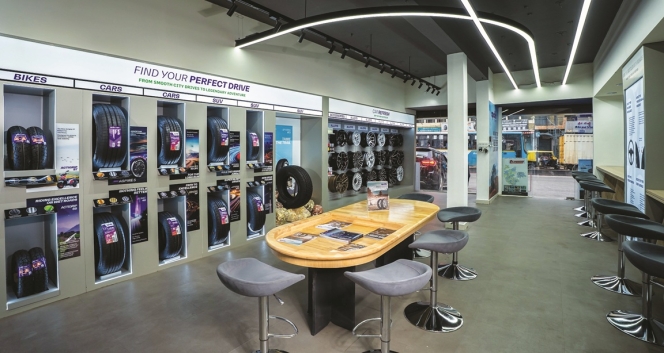
India’s tyre retail industry is undergoing a dramatic makeover, moving far beyond the cluttered workshops and transactional buying of the past. Fuelled by rising demand for premium vehicles, digital-first customers and stronger export momentum, tyre makers are transforming retail spaces into sleek, immersive experience centres. What was once a routine utility purchase is rapidly evolving into a premium, advisory-led mobility experience designed for a new generation of motorists.
India’s tyre retail scene is shifting gears, leaving behind the era of crowded workshops and impersonal counters. In their place, manufacturers are rolling out sleek, thoughtfully designed, tech-powered spaces that echo the luxury of high-end car showrooms. What started as a few bold pilots in big cities has quickly become the go-to playbook for tyre brands eager to win over a new generation of savvy, comfort-loving, digital-first customers.
From urban to rural areas, this transformation reveals a profound change in how Indians approach mobility. Today’s motorists – especially those behind the wheel of SUVs, luxury sedans and electric cars – want more than just a tyre swap. They crave expert advice, a polished atmosphere and a shopping experience that reflects the elegance of their vehicles. Once a utilitarian afterthought, tyre retail is now emerging as a coveted part of the automotive journey.
Strong OEMs and replacement demand in both domestic and export markets underpin the transition.
In FY 24-25, tyre exports from India surged by nine percent year-on-year to INR 251 billion, according to data released by the Ministry of Commerce. With an estimated annual turnover of INR 1 trillion and exports exceeding INR 250 billion, the Indian tyre industry stands out as one of the few manufacturing sectors in the country with a high export-to-turnover ratio.
Though tyre exports have hit a speed bump due to higher US tariffs on select categories of Indian tyres compared to those of competing nations, the long-term prospects for the Indian tyre industry remain strong. According to a joint report by ATMA and PwC India titled ‘Viksit Bharat 2047: Vision and Roadmap for the Indian Tyre Industry’, India’s tyre production volumes are projected to grow nearly fourfold by 2047, while industry revenues are expected to expand almost 12 times to about INR 13 trillion.
Against this backdrop, tyre makers are modernising aggressively to retain customers and build a more profound emotional affinity. The broad shift is visible in how retailers are reinventing their spaces. Lounges with crafted lighting, upholstered seating, minimalist décor and large digital walls are replacing traditional steel racks and dusty counters. Informational murals and heritage display trace decades of tyre innovation, strengthening brand storytelling. Stores increasingly feature curated experience zones where customers can explore tyre technologies, EV-compatible profiles, eco-friendly materials and performance characteristics through visual displays and interactive tools.
A clear sign of this trend is the rise of personalised, advisory-led engagement, replacing the old dependence on technicians. Retailers now profile driving habits, terrain usage, daily distance and vehicle type to recommend tyres customised to each consumer’s pattern. This service-led model is shifting the customer’s mindset from price-first decision-making to long-term value evaluation.
The new premium outlets are designed to deliver a lifestyle-driven, hospitality-grade experience rather than a traditional tyre shop visit. Customers receive personalised mobility recommendations tailored to their vehicle, driving style and needs, supported by smart service innovations like intelligent product selection, quick-fit services and digital scheduling. The space also acts as a community hub for driving enthusiasts, creating a connected ecosystem around the brand. With lounge-style comfort, immersive storytelling and specialised tyre and service packages for luxury and performance vehicles, the outlet blends convenience, premium care and brand-centric offerings into an elevated customer experience.
“Customer experience at the point of sale is another branding exercise poised to change buyer characteristics. Multi-brand outlets often commoditise the tyre-buying experience. That’s why companies are launching exclusive brand outlets with curated customer experiences. Over the next decade, new delivery models will emerge,” said Kavan Mukhtyar, Partner and Leader – Automotive, PwC India.
Apollo Tyres articulates this change as a move towards lifestyle-led retailing. Its new super-premium outlets have been built not as showrooms but as emotionally resonant spaces.

Udyan Ghai, Group Head of Marketing at Apollo Tyres, explained that the company’s new retail architecture is anchored in long-term strategic priorities: “Our move to a lifestyle-led, immersive tyre retail format is driven by our own desire for premiumisation and category leadership. We are looking at elevating tyre retail in India by setting new benchmarks and shifting from commodity selling to a premium, lifestyle-driven experience.”
He said the brand aims to ‘emotionally engage with customers, offer tailored solutions, build a community of driving enthusiasts and tap into premium segments – all while delivering a differentiated, modern retail experience’.
Ghai believes retail ambience plays a decisive role in influencing perception. “A relaxed and well-designed lounge signals comfort, trust and premium value,” he said, adding that such environments elevate tyres from a mundane requirement to a core element of vehicle care and identity.
Digital transparency, he believes, is the second pillar of modern tyre retail. “Digital systems ensure transparency and help demystify tyre selection – tread patterns, speed ratings, durability and fitment. Consumers feel less dependent on a technician’s word and more in control, which boosts their confidence and perceived fairness,” Ghai said.
Customers today are inundated with choices, and digital systems, he said, turn tyre buying into an ‘informed, personalised decision’, comparable to selecting a smartphone, a pair of performance shoes or even a detailed insurance plan. According to Ghai, this new retail model is ‘a strategic investment in the future of mobility retail’, designed to be scalable and to support community-building events, workshops and enthusiast interactions. As India moves towards EVs and connected cars, he said these premium outlets will provide EV-focused tyre expertise, interactive digital tools and personalised recommendations that appeal to younger, digitally savvy motorists.
CEAT shares a similar philosophy. Its national retail revamp focuses heavily on digital immersion, consistent messaging and design-led layouts. Lakshminarayanan B, the company’s Chief Marketing Officer, said the modernised CEAT Shoppes are fundamentally reshaping the category.

“The modern layouts and digital integration in CEAT Shoppes are revolutionising the tyre-buying experience, making it more experiential and customer-centric,” he said, adding that these updated outlets elevate the experience, build trust through uniform communication and drive decisions by reducing ambiguity around features and value.
Lakshminarayanan highlighted CEAT’s attempt to harmonise customer experience across demographics: “The approach in urban markets through premium stores, product offerings and services is to create access and aspiration for premium customers. The same is replicated in upcountry markets also.”
The CEAT Executive said the company is building for a future where personalisation will be the defining characteristic of tyre retail. “CEAT is focused to drive the future of tyre retail through end-to-end personalisation,” he said.

As experiential retail takes hold, service portfolios inside tyre stores are expanding faster than ever. Advanced wheel balancing, laser-driven alignment systems, nitrogen inflation, premium alloy wheel installations, EV-oriented tyre consultations, digital appointment scheduling and real-time tyre-health diagnostics are now standard. Many outlets also provide car detailing, interior cleaning, ceramic coating, PPF application, brake checks, battery inspections and multi-point vehicle health reports, making them full-fledged mobility centres.
Global players have pushed the envelope even further. Michelin’s 25,000-square-foot Experience Store in Nashik features a heritage wall and innovation displays showcasing electric mobility, materials science and environmental responsibility. It houses precision wheel-alignment bays, detailing studios, and accessory galleries. “We are proud to unveil Michelin’s first Experience Centre in India. The sole purpose of this store is to go beyond traditional tyre retail and provide customers with an immersive experience of the brand,” said Shantanu Deshpande, Managing Director of Michelin India.
Continental Tyres is also strengthening India’s premium retail ecosystem through its CPD outlets, which include ambient lounges, diagnostic equipment, premium alloy wheels and digitally enabled guidance. “With our new CPD store in Indore, we bring Continental’s promise of safety, innovation and comfort closer to Madhya Pradesh’s clients,” said Samir Gupta, Managing Director of Continental Tyres India. He added that the brand’s ‘In the Market, For the Market’ approach is central to its retail expansion strategy.
Even in rural markets, tyre retail is becoming more formalised, structured and service-oriented. JK Tyre’s ‘Steel Wheels’ format is targeted at towns with populations under 100,000 and offers standardised layouts, value-added services, best-in-market pricing and instant claim facilities. “Our Rural expansion programme will help us reach the interiors of the real Bharat that is economically vibrant but often underserved. We are not just building retail points; we are also enabling entrepreneurship and access,” said Managing Director Anshuman Singhania.
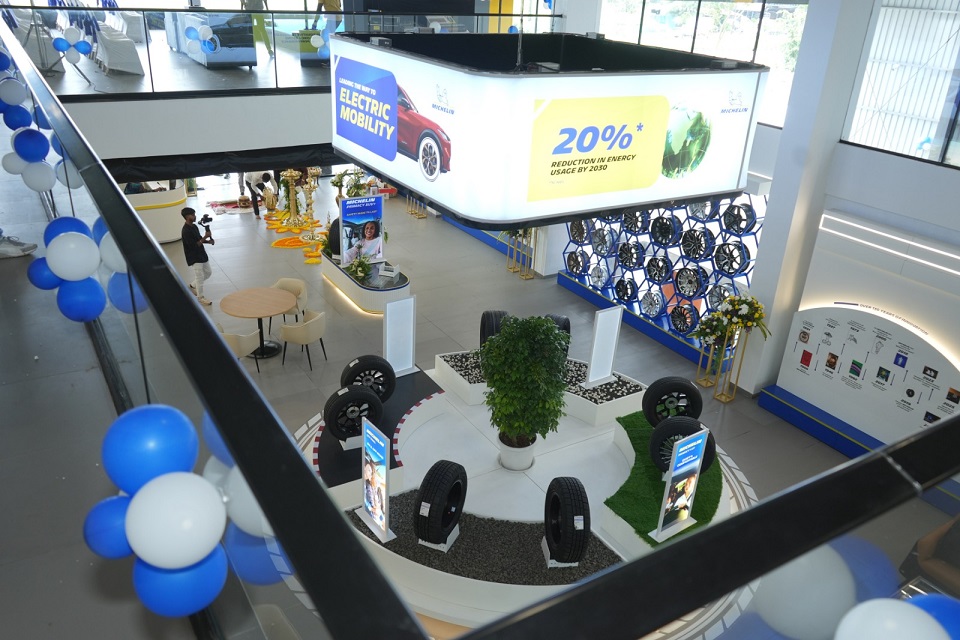 Together, these developments mark a decisive shift in how tyre brands engage customers. Tyre stores are increasingly functioning as lifestyle environments, designed for comfort, informed decision-making, personalisation, transparency and community. The industry is moving away from a product-first mindset to a customer-experience-led philosophy.
Together, these developments mark a decisive shift in how tyre brands engage customers. Tyre stores are increasingly functioning as lifestyle environments, designed for comfort, informed decision-making, personalisation, transparency and community. The industry is moving away from a product-first mindset to a customer-experience-led philosophy.
As premium cars, SUVs and EVs become mainstream, and as younger motorists prioritise digital empowerment and ambience, tyre retailers are aligning with these new expectations. India’s tyre makers are building a retail landscape where experiential engagement, technology integration, service breadth and emotional connection define long-term brand success.
For an industry long anchored in grease, metal and functionality, the transformation is profound. Tyre retail in India is no longer just about fitment; it is becoming a premium mobility experience, curated for a generation that demands clarity, comfort and an elevated relationship with every aspect of vehicle ownership.
Kumho Tire To Build First European Plant In Poland With $587mln Investment
- By TT News
- December 05, 2025
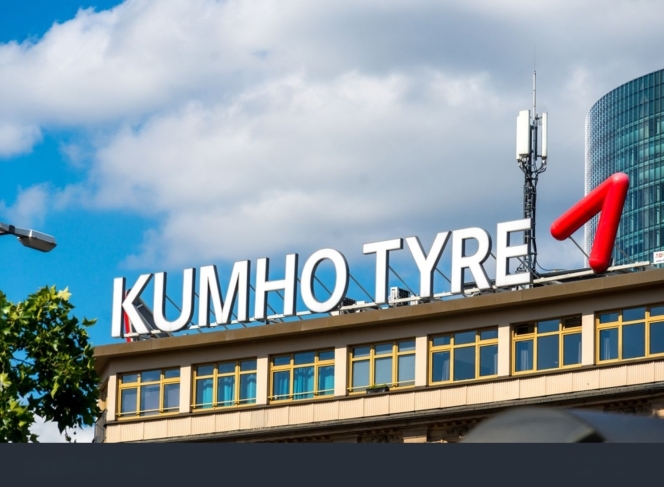
Kumho Tire will establish its first European manufacturing plant in Poland’s Opole region as the South Korean company seeks to expand its position in one of the world’s largest tyre markets.
The group said the factory is scheduled to begin initial operations in August 2028, subject to investment approval and licensing. Kumho plans to produce 6m units annually in the first phase and expand capacity in line with demand. Total planned investment is USD 587 million.
Kumho has spent recent years evaluating multiple European locations, including Poland, based on logistics, labour availability, infrastructure, market access and investment incentives. The company said Opole was selected as the optimal site owing to supply-chain stability within the EU and the region’s supportive operating conditions.
Europe accounts for about a quarter of global tyre consumption and is home to several major automotive manufacturers. The region represented roughly 26.6 per cent of Kumho’s sales last year. The company has previously relied on exports to serve European customers, which it said limited its competitiveness in the market.
The new plant is intended to strengthen Kumho’s ability to supply high-value-added products, including high-performance and larger-diameter tyres, to European vehicle makers.
Kumho currently operates eight production sites across South Korea, China, the US and Vietnam, with combined annual output of 65 millionunits. The Polish plant will complete what the company describes as a production network spanning Asia, Europe and North America.
Jung Il-taek, Kumho Tire’s Chief Executive, said: “The European market occupies a very important strategic position in the global tire industry,” adding that “Kumho Tire will go beyond simple exports and dramatically enhance premium brand value by strengthening quality and service competitiveness through local European production and supply.”
Tyre Stewardship Australia Appoints David Fraser As Chair As David Spear Steps Down
- By TT News
- December 04, 2025
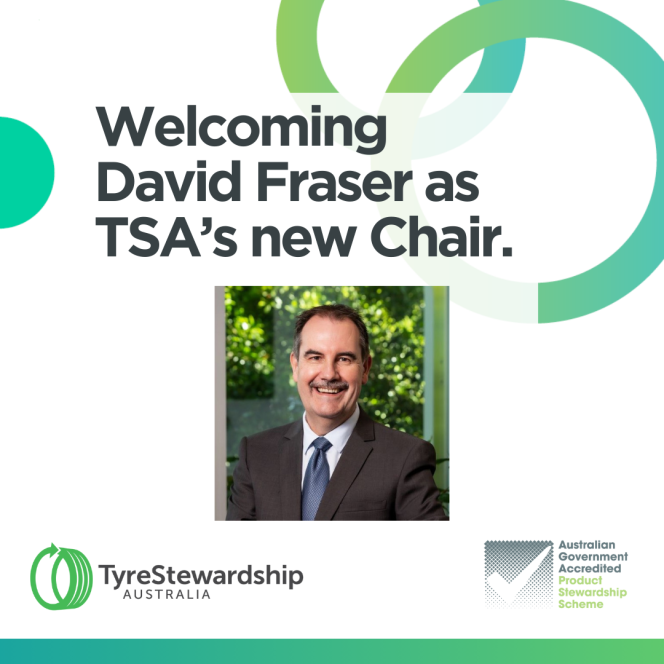
Tyre Stewardship Australia has appointed David Fraser as its new chair, succeeding David Spear after nine years in the role during a period of regulatory and industry change in the country’s tyre-recycling sector.
Spear’s departure closes what the organisation described as a challenging yet incredibly important chapter for its efforts to advance circular outcomes for Australia’s end-of-life tyres. TSA, an industry body backed by government and sector participants, oversees the national stewardship scheme and promotes recycling and re-use pathways for waste tyres, an area facing increasing scrutiny under Australia’s environmental and product-stewardship policies.
In a statement, TSA said it “thank[s] him for his unwavering support and dedication to driving circular outcomes for Australia’s end-of-life tyres”.
Fraser, a TSA director since 2023, brings experience in governance and compliance. He joins at a time when Australian states are tightening environmental standards and seeking to reduce landfill through higher recycling targets. TSA said Fraser has “deep understanding of our strategy, our challenges and the opportunities ahead”.
The organisation added: “We look forward to his leadership as TSA enters its next chapter.”
TSA also expressed appreciation to Spear “for your contribution and support of our mission”, and welcomed Fraser, saying it is “excited and ready for what lies ahead”.







Comments (0)
ADD COMMENT